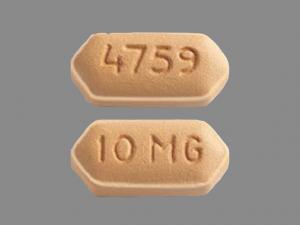Effient Dosage
Generic name: PRASUGREL HYDROCHLORIDE 5mg
Dosage form: tablet, coated
Drug class: Platelet aggregation inhibitors
Medically reviewed by Drugs.com. Last updated on May 26, 2025.
Initiate Effient treatment as a single 60 mg oral loading dose and then continue at 10 mg orally once daily. Patients taking Effient should also take aspirin (75 mg to 325 mg) daily. Effient may be administered with or without food.
Timing of Loading Dose
In the clinical trial that established the efficacy and safety of Effient, the loading dose of Effient was not administered until coronary anatomy was established in UA/NSTEMI patients and in STEMI patients presenting more than 12 hours after symptom onset. In STEMI patients presenting within 12 hours of symptom onset, the loading dose of Effient was administered at the time of diagnosis, although most received Effient at the time of PCI. For the small fraction of patients that required urgent CABG after treatment with Effient, the risk of significant bleeding was substantial.
Although it is generally recommended that antiplatelet therapy be administered promptly in the management of ACS because many cardiovascular events occur within hours of initial presentation, in a trial of 4033 NSTEMI patients, no clear benefit was observed when Effient loading dose was administered prior to diagnostic coronary angiography compared to at the time of PCI; however, risk of bleeding was increased with early administration in patients undergoing PCI or early CABG.
Dosing in Low Weight Patients
Compared to patients weighing ≥60 kg, patients weighing <60 kg have an increased exposure to the active metabolite of prasugrel and an increased risk of bleeding on a 10 mg once daily maintenance dose. Consider lowering the maintenance dose to 5 mg in patients <60 kg. The effectiveness and safety of the 5 mg dose have not been prospectively studied.
Frequently asked questions
More about Effient (prasugrel)
- Check interactions
- Compare alternatives
- Pricing & coupons
- Reviews (21)
- Drug images
- Side effects
- During pregnancy
- Generic availability
- FDA approval history
- Drug class: platelet aggregation inhibitors
- Breastfeeding
- En español
Patient resources
Professional resources
Related treatment guides
See also:
Further information
Always consult your healthcare provider to ensure the information displayed on this page applies to your personal circumstances.


